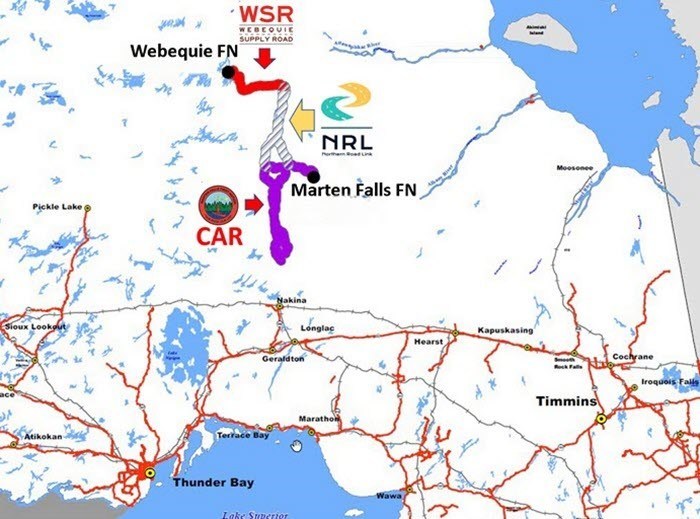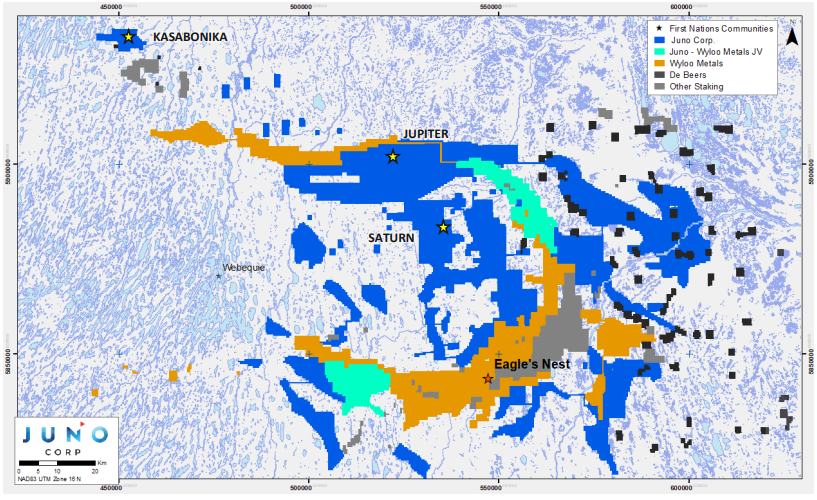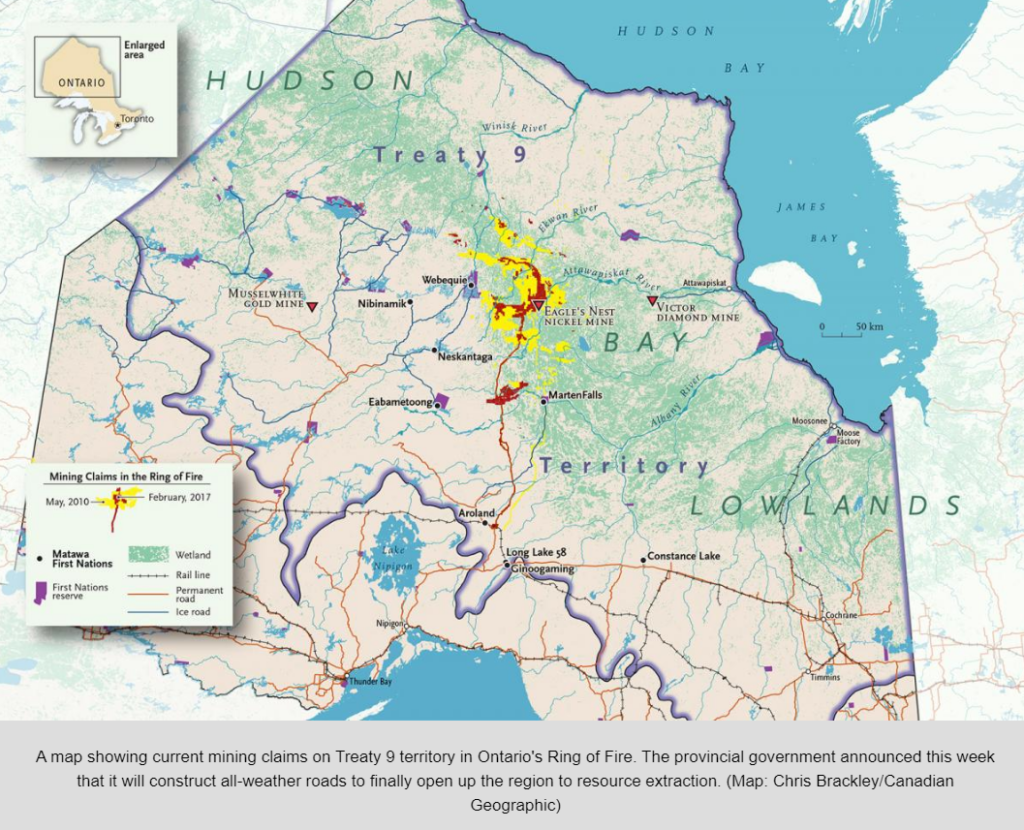Without a doubt, the Ring of Fire camp and its many strategic minerals that include nickel, copper, platinum group metals, chromite and titanium – just to mention a few as explorers have just scratched the proverbial surface – is the most important mining discovery in Canadian history. It may even exceed the legendary Sudbury Basin some day.
Discovered in 2007, the region is located approximately 450 kms. northeast of Thunder Bay in the isolated and vast peatlands of Hudson Bay which itself is roughly the size of Norway but with only about 10,000 people. Contrary to fanatical ENGOs, sustainable mineral development and exploration practices will have minimal impact on the environment and provide the critical minerals needed to stop global warming. Australian miner Wyloo owns the Eagle’s Nest nickel/copper mine and various chromite deposits. Canadian owned Juno Corp is the other main explorer in the district and controls roughly 52 percent of the mine claims.
Webeque and Marten Falls First Nations, on whose traditional territories the majority of mineral deposits have been found, support sustainable mineral development. The leadership of some other First Nations, who are located hundreds of kilometers away from the proposed mine currently oppose the project. A possible agreement between the province and Aroland First Nation, where the road into the isolated region would start, seems promising as recently indicated by Premier Ford.
The discovery’s importance in helping Ontario attract roughly $43 billion, and counting, of new electric vehicle investment and the potential of providing multi-generational jobs and economic opportunities to the isolated and urbanized Indigenous communities across Northwestern Ontario is clearly understood by the Doug Ford Conservatives, yet unfortunately, not by the Justin Trudeau Liberals in Ottawa.
Concerning the federal government’s tepid support for the development of the Ring of Fire, I would like to highlight some key geo-political and economic reasons that the road to the Ring of Fire needs to start construction later this summer.
Russia/Ukraine War
The Russian invasion of Ukraine in February 2022 has changed everything. Russia was the largest global supplier of many critical minerals needed for decarbonization. If cobalt from the Congo, mined by poor black children was a problem for western consumers, it can be safe to assume that no one wants to buy an electric vehicle supplied with “blood nickel” or any other commodity from Russia.
The Stockholm International Peace Research Institute estimates that in 2023, global military spending was about $2.4 trillion, the most in 15 years. Many European analysts and military leaders fear the war in Ukraine, combined with the Gaza/Israeli conflict and a possible Chinese invasion of Taiwan will spark a Third World War. There is no doubt these and other conflicts or potential ones in South Sudan, Ethiopia, Eastern Congo, North Korea and Myanmar, just to name a few, is putting enormous pressure on mineral commodities essential for military production and possibly divert limited supplies from decarbonization initiatives.
For instance, nickel specialty alloys are critical for military jet fighters, corrosion resistant amphibious assault ships, aircraft carriers and nickel-hardened steels for tanks and other vehicles. A 1954 U.S. Department of Defense report stated that nickel was, “the closest to being a true ‘war metal’. It deserves first priority among materials receiving conservation attention”. During the 1950s, the U.S. government gave Falconbridge a $40 million subsidy – using 1955 as a baseline, that subsidy would be worth $455 million today – to help develop a Sudbury mine to ensure diversity of supply from the predominate producer of that time, International Nickel!
At the some time, the American military also provided very lucrative “cost plus incentive” contracts to Dension Mines and other producers to rapidly develop the rich uranium mines in Elliot Lake, the vital raw material for expanding U.S. nuclear weapon stockpiles.
Roughly 3.6 million tonnes of nickel were mined in 2023 and Glencore has predicted global demand could grow to 9.2 million tonnes in 2050 mostly due to EV battery marked. I suspect skyrocketing military demand was not included in those statistics.
And setting aside military demand, if all the proposed western electric vehicle manufacturing operations are built, today’s North American nickel production, largely from Sudbury, Thompson, Man., Voisey’s Bay, N.L. and Raglan in Quebec is not enough. New production needs to come on stream. And as in most sulphide nickel camps around the world, many mines are often found. The same will eventually happen in the Ring of Fire.
Today, the American military are again very concerned about security of supply for essential commodities and under the Defence Production Act, recently funded two Canadian junior mining projects, Fortune Minerals’ Northwest Territories cobalt-gold-bismuth-copper mine and processing facility and Lomiko Metals graphite deposit in Quebec. Many more funding announcements are sure to follow. Considering the enormous mineral potential of the Ring of Fire, the American military would view the start of the road very favourably.
President Trump?
The Canadian political elite are dreading the upcoming American election in November. There is a possibility of a Trump victory and that would be a severe problem for the Trudeau Liberals due to their anemic military spending and the 2026 review of the United States-Mexico-Canada Agreement (USMCA). Under Trump, expect to see hard economic bargaining and possible concessions during the review.
In 2023, if countries with extensive social programs such as Finland (2.45%), the Netherlands (1.7%), France (1.9%) and Britain (2.07%) can meet the 2% of GDP military spending goals or come very close, there is no excuse for Canada (1.38%) to keep freeloading on the American coattails. It’s a national embarrassment for the country and for our military elite who remember the outsized contributions this country provided in two world wars and the Korean conflict. We will be “politically eviscerated” if Trump wins the presidency and he may use some form of economic sanctions or penalties to force us to increase our military expenditures.
America is in an economic war with its main rival China. The competition between them over the critical minerals essential for decarbonization, North American reshoring initiatives due to COVID global supply chain disruptions as well as increased military production, is cut-throat and fierce.
The Chinese seem to be flooding the world with cheap supplies of “dirty” Indonesian nickel, essential for EV batteries, that economically undercuts production in Australia and potentially Canada, threating western supplies that are largely sustainable and green. In 2023, China cut off or restricted access to gallium and germanium, essential minerals for semi-conductors and various military applications and has also cut graphite exports. China and its allies have no problem using raw material shortages as a powerful economic weapon.
The recent closure of Panama’s massive copper mine, political instability in nickel-rich New Caledonia, rising resource nationalism and geo-political competition for other critical metals throughout Africa, Latin America and Asia are all threatening access to vital strategic raw materials for Western economies. Security of supply for these essential minerals has become of paramount importance to American politicians and their powerful military industrial complex.
Starting the road into the Ring of Fire this year, would start timely development of future mines in the Ring of Fire and help ensure security of supply for a wide variety of critical minerals essential for our American neighbours.
This also helps leverage some much-needed time for Ottawa’s political leadership to devise a credible plan to increase our military spending to the 2% GDP threshold and gives us enormous economic clout during our North American Free Trade review in 2026.

Melting Winter Roads/Global Warming
Global warming is here and its impact on the vital winter roads to isolated First Nation’s communities in Ontario’s far Northwest has been severe. This has been one of the shortest winter road seasons on record. Winter roads are vital to ensure the delivery of bulk products that would cost considerably more if they were flown in.
Ironically, the ENGOs have been vehemently opposed to the road and the sustainably green Ring of Fire mine development that would produce the critical minerals needed to stop global warming. The alternatives to increasing supple is the dirty nickel coming from Indonesia, where there is no rule of law, low labour standards, and biodiverse rainforests are being razed for huge open pit nickel laterite mines which will most likely not be restored. And let’s not forget the pristine coral reefs are being destroyed by deep sea tailings disposal and the carbon intensity of coal-fired power production.
Wyloo is working hard to sustainably build their Eagle’s Nest nickel mine with very low environmental impacts. Tailings will be stored underground and all processed water will be recycled. The actual mine disturbance is less than ONE square kilometre – that includes airstrip, supply storage and other surface buildings aside from the mineshaft – which will release about 0.046 Metric tonnes of carbon, according to the company.
Wyloo estimates that $100 million a year will be dedicated to First Nations businesses and the life of the mine will be at least 20 years, though most feel that it will last much longer as the deposit is open at depth.
Eighty per cent of the road will be built on raised eskers – which are sands and gravels left behind by melting glaciers and contain no carbon absorbing peat. The remaining 20 percent of the road will be built over peatlands and use modern floating geo-textile and geogrid materials that rest on top of the muskeg allowing it to continue to store carbon. This technology has been successfully implemented in the oil sands region of Alberta, northern Manitoba and in Scotland, all areas with extensive peatlands.
The economic benefits of the north-south road include reduced food costs as well as a healthier supply of fresh fruit and vegetables, all year access to building materials and other products and quicker and less expensive access to southern medical and entertainment facilities. In addition, by ending the isolation, it would also be easier to attract skilled teachers and other professionals. There would be maintenance jobs after the road is complete and perhaps some sort of ownership between the five isolated Matawa communities and the province could be negotiated that could bring in revenue.
The current negotiations with Aroland First Nation, if successful, could see the start of road construction. Or more accurately road widening as there is currently about 100 kilometres of forestry road on Aroland’s traditional territory. There could be very little environmental studies or none at all as the forestry road is already built. Considering the fact that climate change is impacting the winter roads much more rapidly than previously thought, construction of the entire north-south road should be accelerated as fast as possible and Ontario must push its own Ministry of the Environment to speed up the process.
Summary
North America cannot be dependent on Chinese controlled critical minerals! We cannot be dependent on Russian supplies of vital resource commodities! Canada is the second largest geologically-rich land mass on earth and our mining practises are sustainable and green. Not to develop the mineral abundance of the Ring of Fire would be a massive insult to our western allies and we would be rightly accused of hording our resources. Much as they currently view us for our failure to develop liquid natural gas plant on both coasts!
Global warming has significantly shortened the winter road season to supply essential goods to the isolated communities in northwestern Ontario. The development of the Ring of Fire would be an enormous economic boost to marginalized Indigenous communities through the region as well as provide many business opportunities to the struggling city of Thunder Bay, the regional hub for Ontario’s northwest.
Starting road construction this year sends a loud and clear message to our western allies – especially our American neighbours – that Canada/Ontario will be a reliable partner for the critical minerals for decarbonization, reshoring initiatives and military procurement. We need to start the road to the Ring of Fire now!
Stan Sudol is a Toronto-based communication consultant, owner/editor of RepublicOfMining.com and has appeared many times on TVO’s The Agenda discussing Northern Ontario issues. stan.sudol@republicofmining.com

























